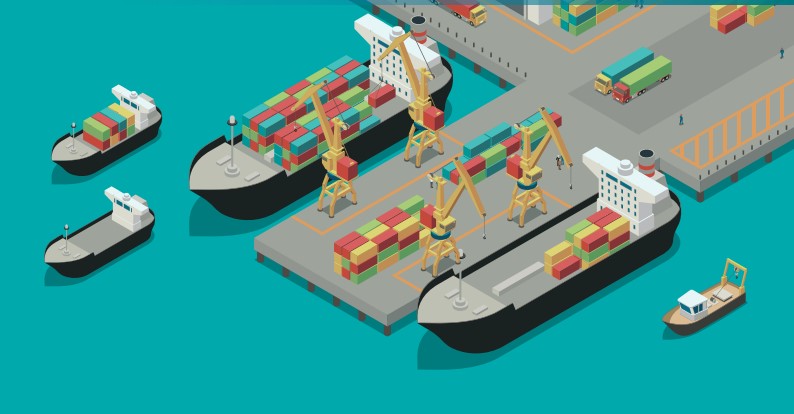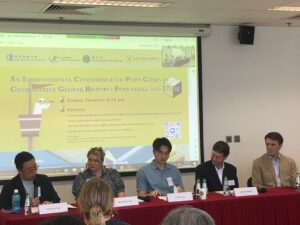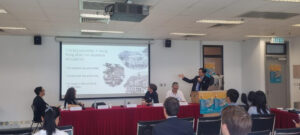 Conference report by Charlotte Steffen
Conference report by Charlotte Steffen
On the 15th and 16th of June, the first ‘International Conference on Ports Cities in Comparative Global History: Potentials and Issues’ took place at Hong Kong Baptist University (HKBU). Attended by a wide group of international scholars in various stages of their careers, it would (over seven panels, two keynote speeches and one roundtable discussion) cover various themes and areas of study on the topic of port cities. It was organized in collaboration with the newly-formed Port Cities and Maritime Cultures Centre (formerly PTUC) at the University of Portsmouth, the History Department, and the Modern History Research Centre at Hong Kong Baptist University and supported by the Lloyd’s Register Foundation. The student helpers from HKBU ensured the smooth and enjoyable continuation of events over the two days.
Day One
Day one began with a warm welcome speech by Professor and Head of the Department of History Dr Clara Wing-Chung Ho and by the Executive Dean of the University of Portsmouth’s (UoP) Humanities and Social Science Department, Professor Anne Murphy. This was followed by the opening keynote-speech, given by Dr Michael Shiyung Liu, Professor at Shanghai Jiao Tong University and was titled ‘Communicating Health amongst Ports: The Beginning of Quarantine’. It was a poignant and relevant paper on the beginning of the historic development of quarantine warning and communication systems amongst countries.
The opening panel, ‘Port Cities Communities’, was chaired by Associate Professor Chi Man Kwong (HKBU). Its three panellists were Professor Brad Beaven (UoP), Mr Clifford Pereira (University of Hong Kong) and Associate Professor Nadine Attewell, (Simon Fraser University). Each scholar reflected on a different aspect of port city communities in their papers, as reflected in the titles of their papers “Port Cities as international contact zones: London’s Sailor Town between 1850 and 1900′; ‘The Rise and Fall of the Goan Community in Eastern African ports 1865-1965,”; and “Relation as Method: Surfacing Diverse Knowledge in the Archives of Colonial Port City Life.”
The second panel was titled ‘Place, Work and Identity’ and was chaired by Associate Professor Ka Chai Tam (HKBU). Taking the audience into the lives of Royal Dockyard Workers through the research of Dr Mel Basset (UoP) in ‘Royal Dockyard workers: Labour, identity and recreational networking in Britain and the wider British Empire c.1880-1940,’ to the fashionable world of the ‘Transnational Cultural Exchange and the Fashioning of Identity: An Analysis of Western Suits in the Hong Kong-New York Corridor, 1945-1980,’ as shown in the research of Dr Katon Lee, (HKBU), and into the deep sea with ‘‘The Silent Service’: Telling the story of Royal Navy submarine warfare, 1939-1945,’ by Dr Robert James (UoP). The panel was completed by Dr Matthew Heaslip (UoP) who brought the audience back to the surface with his research regarding ‘Royal Navy Officers in interwar East Asia, their careers, and personal consequences.’
The third panel of the day was chaired by Dr Robert James (UoP) and focused on ‘Port City Spaces. Its four panellists were Ms Xiaoxu Yan (University of Hong Kong), Associate Professor Chi Man Kwong (HKBU), Research Assistant Professor Catherine Chan, (Lingnan University) and Mr Chia Pei Lim (National Chengchi University). Their papers covered a variety of topics from the political perils of public transportation in ‘Integrating the Multinational Urban Space: Tramway Network in treaty-port Tianjin, 1902-1908,’ to the military in ‘Port Cities Under Military Occupation: Re-approaching the Japanese Occupation of Hong Kong from Spatial Perspective,’ to colourful individuals such as Vincente Sotto in ‘Fugitives in Liminal Spaces: Hong Kong and the Philippine Islands, 1907-1914,’ to finally ‘Exploring Maritime History through Digital Humanities: The Southeast Asian Maritime Travelogues Corpus (SEA-MTC).’
The first day was then concluded through the second keynote speech by Dr César Ducruet of the Centre National de la Recherche Scientifique. His speech titled ‘Port-city Dynamics since 1880: A Maritime Network Perspective,’ gave an amazing insight into using big data to analyse the connection between, ports, cities, and cargo size.
Day Two
Day Two began with the panel titled ‘Mobilities and Boundaries.’ Chaired by Dr Katon Lee (Hong Kong Baptist University), it took its audience to all corners of the Earth. Beginning in Europe, it was opened by Ms Charlotte Steffen with her paper titled ‘Beyond China Town- The Multi-national Migration of Chinese Students in Europe. She was followed by Assistant Professor Elvan Cobb, (HoKBU) whose research travelled to the Mediterranean win ‘From Caravan Routes to Railways: Navigating the Global Mobilities of Izmir, a Port City in the Eastern Mediterranean’. The final port of call was a small town in Nicaragua in the research of Dr Rudolph Ng, (UoP) in ‘Bluefields: A Curious Chinese Port City in Nineteenth Century Nicaragua.’
Touching upon the natural and supernatural was the second panel of the day titled ‘Port Cities and Port Cultures in the Imagination’ which was chaired by Assistant Professor Elvan Cobb. Starting the panel was Professor Timothy Wong whose paper ‘Public Health Challenges in the port-city under the Zenith Cold War: Leprosy in Hong Kong as a Case Study’. He was followed by Associate Professor Ka Chai Tam , (HKBU) with his paper titled ‘The Chinese Collections of Foreign Social and Legal Information from 14th to 16th centuries.’ Leaving the law of the land, for the myth of the sea was Associate Professor Karl Bell, (UoP) with “Seafarers and Sea Fearing: Nineteenth-Century Maritime Folklore as Hidden Intangible Heritage.” Finally, bringing the audience back to the future was Professor Holger Briel, (Beijing Normal University & Hong Kong Baptist University United International College). His paper was titled ‘Seeing Cities from the Future: Port city societies in Science Fiction and their lessons for Today.’
The third panel of the Day brought the attendees back to port. Titled ‘Port City Exchanges’ it was chaired by Ms Charlotte Steffen. The opening scene was set with ‘Building a Movie Empire – Runme Shaw’s adventure in Singapore, 1920-1980,” by Professor Po Yin Chung and Ms Cho Kiu Wong, (HKBU). They were followed by Assistant Professor Joshua Ehrlich’s, (University of Macau) paper on “The Boundaries and Boundedness of Port Cities,’ which reflected on the limitations of port towns and how to overcome them. Mr Corey Watson (UoP) reflected on “Surveyors after hours: The social and personal lives of Lloyd’s Register Surveyors in China in relation to maritime networks, 1869-1925’. Assistant Professor Lok Yin Law (Hong Kong Metropolitan University) was the final presenter of the panel whose paper on “Riviera of the Orient: Pre-War Hong Kong and the Making of Global Tourism Network,’ gave great insight into the historic evaluation of official visualization and advertisements.
The fourth and final panel of the conference was chaired by Dr Matthew Heaslip. It was titled ‘Port City Heritage: potential in Present and future practice’. Opened by Professor Richard T. Griffiths (Leiden University) his paper ‘Creating a Virtual Museum for the Maritime Silk Road,’ offered insight into using the digital world to the benefit of the museum’s sphere in an educational manner. The second paper was titled ‘Conserving and protecting maritime heritage sites – threats and opportunities.’ Co-authored by Professor Sarah Ward (Dalian Maritime University), Professor Steven Gallagher, (The Chinese University of Hong Kong), and Associate Professor Mingfei Ma, (Dalian Maritime University), it gave insight into the importance, threats, and best practices regarding underwater heritage. Followed by Professor Ran Guo, (Shanghai Maritime University), who gave further insight into the conservation of underwater heritage in his paper ‘UCH Tourism in China: A Practical Path for Public Awareness, Investment and Better Protection.’ Closing the panel was Ms Laura Boon, (Royal Museum Greenwich) with her paper on the “Linkages between industrial pasts and environmental future’, detailing the perils of sea blindness and its environmental impact.
After the final panel, the conference moved on to the roundtable discussion regarding Port Cities in Comparative Global History. Chaired by Dr Mel Bassett, its lead speakers were Alex Stitt from Lloyds Register Foundation, Professor Brad Beaven and Professor Timothy Wong. A stimulating dialogue commenced, highlighting various potentials and issues that would allow for engaging future collaborations of all parties involved. It was also announced that in two years, the University of Portsmouth would host a second follow-up conference at their home institution.
Overall, the conference proved to be a highly rewarding and educational experience with researchers presenting their work in a supportive and open environment. It not only displayed a multifaceted approach to the research that is being conducted in this area, but also led to some amazing discussion and hopefully great future collaborations.
See the full programme – with abstracts and biographies – here: Port Cities Conference Programme 2023.











